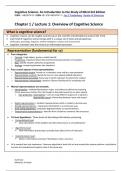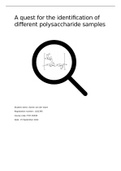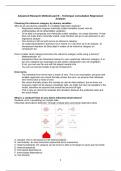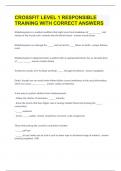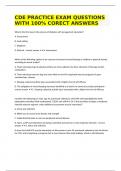Psychopathology revision notes
Definitions of Abnormality
Abnormality = A psychological or behavioural state leading to
impairment of interpersonal functioning and/or distress to
others.
Statistical infrequency
A01
abnormality is any substantial deviation from the statistically calculated average
In any measurable human characteristic, most people’s scores will cluster around the
average. As we move away from the average, fewer and fewer people will attain that score.
This is called the NORMAL DISTRIBUTION.
Those who fall within the “golden mean” – those who do what most other people do – are
normal, those who behaviour differs from the golden mean and the majority are abnormal.
This way of defining abnormal behaviour is suited to areas like depression, anxiety and
intelligence because we know that within these measurable areas most people’s scores
will cluster around an average.
for example, an average IQ score is about 100, only 2% of people have a score below
70. Those individuals scoring below 70 are very unusual or ‘abnormal’, are liable to
receive a diagnosis of a psychological disorder – intellectual disability disorder (what
used to be known as mental retardation.)
It is important to decide how far above or below someone has to be in order to be
labelled as ‘abnormal’. This is done by using the standard deviation of the scores.
Standard deviation is calculated by working out how far each score is away from the
average. The cut-off point is generally put at +/- 2 SDs from the mean.
A03
STRENGTHS
This definition of abnormality provides a quantitative measure of abnormality.
This is therefore an objective way of assessing abnormality.
This is a strength because, an objective measurement is far more likely to produce reliable
and consistent findings. Someone else administering the same test is likely to get the same
results and draw the same conclusion about abnormality (reliability).
, There are real life applications for the statistical definition of abnormality.
For example, assessing somebody’s intellectual ability can be very useful as part of a clinical
assessment of a patient.
This means that this definition of abnormality is useful in clinical practice.
WEAKNESSES
Some abnormal behaviour is desirable:
E.g. very few people have an IQ over 150, yet we wouldn’t suggest having a high IQ is
undesirable. Likewise, stress or depression is relatively common, yet undesirable.
Therefore, SI is unable to distinguish between desirable and undesirable behaviours.
Cultural relativism: The view that behaviour cannot be judged properly unless it is
viewed in the context of the culture in which it originates.
Behaviours that are statistically infrequent in one culture may not be in another. E.g. one of
the symptoms of Sz is hearing voices, yet this is an experience that is common in some
cultures.
This may create problems for people from one culture living in another cultural group.
Deviation from social norms
A01
Someone could be deemed abnormal if they were to violate social norms. Social
norms are behaviours that are seen as acceptable and expected within a given
society e.g. politeness.
The ‘abnormal’ behaviour is seen as unpredictable, causing observer discomfort and
violating moral or ideal standards because this differs from what most people do.
Behaviour that deviates from social norms can be incomprehensible to others and
make them feel threatened or uncomfortable.
A03
STRENGTH:
, This definition explains why different cultures have alternative ideas of what is
abnormal or normal behaviour.
This definition also takes into account that there is no universal rule about what is
‘abnormal’.
This is a strength because this definition does not impose any cultural bias on
individuals.
WEAKNESSES:
Cultural relativism:
Social norms differ between cultures and what is considered normal in one culture may be
abnormal in another.
For example, in some countries in the world homosexuality is still illegal, and therefore
considered abnormal. However, in the rest of the world homosexuality is considered
normal.
The result of this is that there is no global standard for defining behaviour as abnormal and
therefore abnormality is not standardised.
Era-dependency;
Social norms vary over time.
E.g. homosexuality was classed as a psychiatric disorder until 1960’s – now it is an accepted
behaviour. (temporal validity).
This means that, historically, reliance on the deviation from social norm definition of
abnormality may have resulted in violations of human rights where people, by standards of
that time, are deemed ‘abnormal’.
Failure to function adequately
A01
A person may cross the line between ‘abnormal’ and ‘normal’ at the point where
they can no longer cope with the demands of everyday life, and they fail to function
adequately.
We might decide that someone is not functioning adequately when they are unable
to maintain basic standards of nutrition and hygiene. We might also consider that
Definitions of Abnormality
Abnormality = A psychological or behavioural state leading to
impairment of interpersonal functioning and/or distress to
others.
Statistical infrequency
A01
abnormality is any substantial deviation from the statistically calculated average
In any measurable human characteristic, most people’s scores will cluster around the
average. As we move away from the average, fewer and fewer people will attain that score.
This is called the NORMAL DISTRIBUTION.
Those who fall within the “golden mean” – those who do what most other people do – are
normal, those who behaviour differs from the golden mean and the majority are abnormal.
This way of defining abnormal behaviour is suited to areas like depression, anxiety and
intelligence because we know that within these measurable areas most people’s scores
will cluster around an average.
for example, an average IQ score is about 100, only 2% of people have a score below
70. Those individuals scoring below 70 are very unusual or ‘abnormal’, are liable to
receive a diagnosis of a psychological disorder – intellectual disability disorder (what
used to be known as mental retardation.)
It is important to decide how far above or below someone has to be in order to be
labelled as ‘abnormal’. This is done by using the standard deviation of the scores.
Standard deviation is calculated by working out how far each score is away from the
average. The cut-off point is generally put at +/- 2 SDs from the mean.
A03
STRENGTHS
This definition of abnormality provides a quantitative measure of abnormality.
This is therefore an objective way of assessing abnormality.
This is a strength because, an objective measurement is far more likely to produce reliable
and consistent findings. Someone else administering the same test is likely to get the same
results and draw the same conclusion about abnormality (reliability).
, There are real life applications for the statistical definition of abnormality.
For example, assessing somebody’s intellectual ability can be very useful as part of a clinical
assessment of a patient.
This means that this definition of abnormality is useful in clinical practice.
WEAKNESSES
Some abnormal behaviour is desirable:
E.g. very few people have an IQ over 150, yet we wouldn’t suggest having a high IQ is
undesirable. Likewise, stress or depression is relatively common, yet undesirable.
Therefore, SI is unable to distinguish between desirable and undesirable behaviours.
Cultural relativism: The view that behaviour cannot be judged properly unless it is
viewed in the context of the culture in which it originates.
Behaviours that are statistically infrequent in one culture may not be in another. E.g. one of
the symptoms of Sz is hearing voices, yet this is an experience that is common in some
cultures.
This may create problems for people from one culture living in another cultural group.
Deviation from social norms
A01
Someone could be deemed abnormal if they were to violate social norms. Social
norms are behaviours that are seen as acceptable and expected within a given
society e.g. politeness.
The ‘abnormal’ behaviour is seen as unpredictable, causing observer discomfort and
violating moral or ideal standards because this differs from what most people do.
Behaviour that deviates from social norms can be incomprehensible to others and
make them feel threatened or uncomfortable.
A03
STRENGTH:
, This definition explains why different cultures have alternative ideas of what is
abnormal or normal behaviour.
This definition also takes into account that there is no universal rule about what is
‘abnormal’.
This is a strength because this definition does not impose any cultural bias on
individuals.
WEAKNESSES:
Cultural relativism:
Social norms differ between cultures and what is considered normal in one culture may be
abnormal in another.
For example, in some countries in the world homosexuality is still illegal, and therefore
considered abnormal. However, in the rest of the world homosexuality is considered
normal.
The result of this is that there is no global standard for defining behaviour as abnormal and
therefore abnormality is not standardised.
Era-dependency;
Social norms vary over time.
E.g. homosexuality was classed as a psychiatric disorder until 1960’s – now it is an accepted
behaviour. (temporal validity).
This means that, historically, reliance on the deviation from social norm definition of
abnormality may have resulted in violations of human rights where people, by standards of
that time, are deemed ‘abnormal’.
Failure to function adequately
A01
A person may cross the line between ‘abnormal’ and ‘normal’ at the point where
they can no longer cope with the demands of everyday life, and they fail to function
adequately.
We might decide that someone is not functioning adequately when they are unable
to maintain basic standards of nutrition and hygiene. We might also consider that


